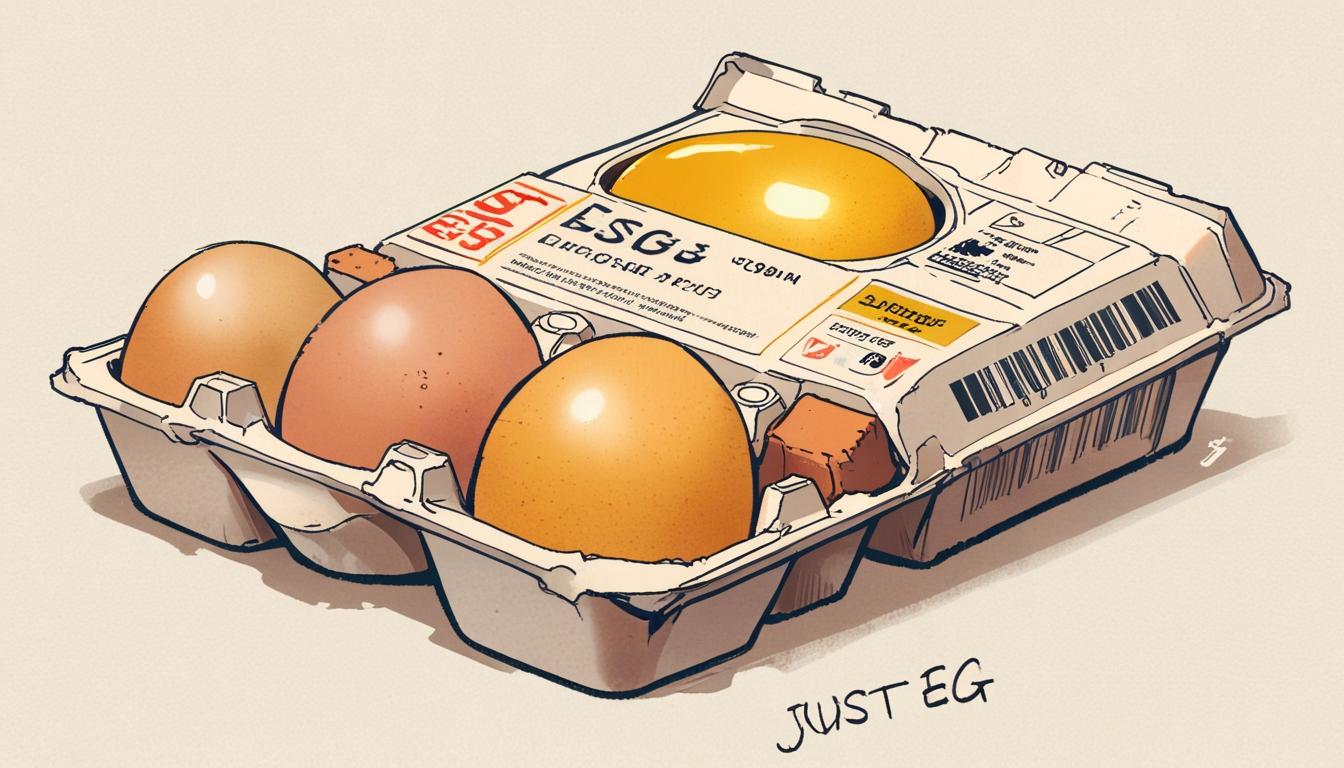Eat Just announces the introduction of its popular vegan egg product, Just Egg, to Europe, following a significant investment from Vegan Food Group to increase production capabilities.
Eat Just, the innovative food technology company based in California, is set to introduce its popular vegan egg product, Just Egg, to the European market. This development follows a newly established distribution agreement with Vegan Food Group (VFG), which is investing £11.5 million (approximately $15.2 million) to enhance production capabilities at its facilities in Europe.
The deal marks a significant milestone for Just Egg, a mung bean-based egg alternative that has been making waves in the United States amidst a prevailing egg crisis that has driven prices to an all-time high. Just Egg is expected to begin production at VFG’s facility in Lüneburg, Germany – noted as the largest dedicated plant-based factory in Europe – by late 2025. The investment will facilitate the establishment of a fully automated production line and boost efficiency across VFG’s operations in the UK and Germany.
Josh Tetrick, co-founder and CEO of Eat Just, expressed optimism regarding the European market, stating, “European consumers clearly desire innovative, sustainable food options, and collaborating with VFG is key to meeting that demand effectively,” as reported by the Grocer. “This investment in the Lüneburg facility represents a crucial step towards making high-quality plant-based egg alternatives widely accessible to our global audience.”
The journey for Just Egg to reach Europe has been protracted. Despite agreeing on a manufacturing and distribution deal with Italian egg supplier Eurovo in 2018, initial plans to launch by the end of 2019 were stalled pending novel food regulatory approvals from the European Food Safety Authority. In October 2021, the product was deemed safe, followed by approval from the European Commission in April 2022.
VFG was established in early 2024 with the ambition of becoming a leading player in the vegan food sector, akin to Unilever. This company also oversees various brands, including VFC and Meatless Farm. The partnership with Eat Just will enable VFG not only to expand its product line but also to enhance automation and product quality while reducing waste.
The announcement of Just Egg’s European debut comes at a time when its sales in the US have surged, attributed primarily to the ongoing avian flu crisis that has led to the culling of over 167 million birds and a significant rise in egg prices, which peaked at $6.23 per dozen in March 2023. In light of the empty shelves in many stores, Tetrick explained that consumers face limited options: “One, don’t eat them. Two, you know, have applesauce. Or three, have Just Egg.”
Just Egg has successfully captured the market for vegan egg alternatives in the US, having sold the equivalent of 500 million chicken eggs. The product’s appeal extends beyond the vegan demographic, with a substantial portion of consumers being neither vegan nor vegetarian. In January 2023, sales reportedly grew five times faster than the previous year, with 91% of shoppers adding Just Egg to their baskets.
VFG’s CEO, Dave Sparrow, acknowledged the partnership with Eat Just as a pivotal moment for the plant-based food sector in Europe, stating, “Our partnership with Eat Just marks a significant milestone, aligning perfectly with our ambition to transform plant-based food across Europe.”
As clock ticks toward 2025, the demand for Just Egg may align with broader market trends. In Europe, egg prices have also surged, reaching their highest levels in a decade at €268.5 (around $292) per 100kg last month, as consumers increasingly seek affordable sources of protein. Market analysts predict that the plant-based egg sector in Europe will grow by 40% annually, projected to reach $3.88 billion by 2031.
Despite potential competition from other brands like Crackd, Perfeggt, and Vegge, VFG remains optimistic about Just Egg’s prospects. Sparrow contended, “There are other egg replacements on the market, but quality-wise, there’s nothing that can stack up against Eat Just.”
While the path forward looks promising for Eat Just and VFG, the plant-based food industry faces challenges, as highlighted by failed products from other brands. Nonetheless, the early developments suggest a potential shift in the European food landscape, laying the groundwork for increased plant-based offerings in the coming years.
Source: Noah Wire Services
- https://www.greenqueen.com.hk/eat-just-egg-europe-uk-launch-vegan-food-group/ – This article supports the claim that Vegan Food Group is investing £11.5M to enhance production capabilities for Just Egg in Europe and that manufacturing is set to begin in late 2025. It highlights Just Egg’s expansion into Europe through its partnership with VFG.
- https://www.thegrocer.co.uk/news/vegan-food-group-to-bring-bestselling-vegan-eggs-in-us-to-europe/703385.article – This article corroborates the partnership between Vegan Food Group and Eat Just to bring Just Egg to Europe. It details VFG’s investment and manufacturing plans for Just Egg at its Lüneburg facility.
- https://www.businesswire.com/news/home/20220405005517/en/European-Commission-Approves-JUST-Eggs-Key-Ingredient-as-Plant-Based-Brand-Plans-Fourth-Quarter-Launch – This article explains the regulatory approvals Just Egg received from the European Commission, allowing its entry into the European market. It also highlights consumer demand for plant-based eggs in Europe.
- https://vegconomist.com/category/food-and-beverage/egg-alternatives/ – This resource provides context on the growing demand for egg alternatives, including Just Egg, as well as trends in the plant-based egg market such as recent launches and consumer attitudes.
- https://www.stylus.com/food-beverage/egg-shortages-prompt-alternative-boom – This article discusses the impact of ongoing egg shortages on the demand for plant-based egg alternatives, such as Just Egg. It also highlights the projected growth of the plant-based egg market in Europe.
Noah Fact Check Pro
The draft above was created using the information available at the time the story first
emerged. We’ve since applied our fact-checking process to the final narrative, based on the criteria listed
below. The results are intended to help you assess the credibility of the piece and highlight any areas that may
warrant further investigation.
Freshness check
Score:
8
Notes:
The narrative mentions specific plans starting by late 2025 and recent developments up to early 2024, indicating relatively fresh content. However, some historical events (like the 2019 plans and 2022 approvals) are referenced, which suggests it is not entirely new.
Quotes check
Score:
6
Notes:
Quotes from Josh Tetrick and Dave Sparrow appear to be recent. However, without direct online references for the earliest versions of these quotes, it’s challenging to verify their originality fully.
Source reliability
Score:
5
Notes:
The narrative originates from Green Queen, which is a less well-known source compared to major news outlets like the BBC or Reuters. However, it does cover a specialized niche in sustainability and vegan lifestyle, which may still lend it some credibility in its domain.
Plausability check
Score:
8
Notes:
The market trends and partnerships described are plausible, given the context of rising egg prices and increased demand for plant-based alternatives. While competition exists, there is evidence that Just Egg has been successful in the US.
Overall assessment
Verdict (FAIL, OPEN, PASS): OPEN
Confidence (LOW, MEDIUM, HIGH): MEDIUM
Summary:
The narrative appears to be relatively fresh and plausible, based on recent market trends and partnerships. However, the quotes and source credibility cannot be fully verified without additional references, leading to an overall medium confidence level.













